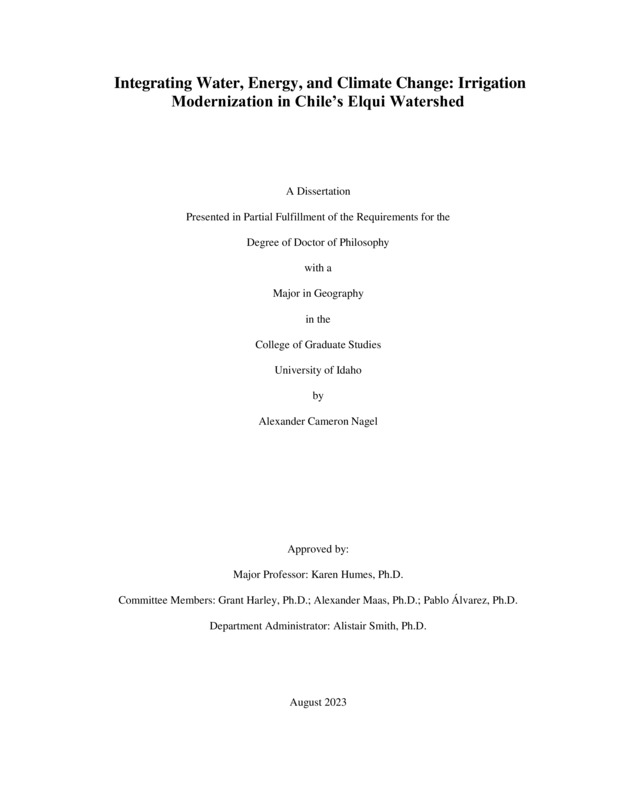Integrating Water, Energy and Climate Change: Irrigation Modernization in Chile’s Elqui Watershed
Nagel , Alexander Cameron. (2023-08). Integrating Water, Energy and Climate Change: Irrigation Modernization in Chile’s Elqui Watershed. Theses and Dissertations Collection, University of Idaho Library Digital Collections. https://www.lib.uidaho.edu/digital/etd/items/nagel_idaho_0089e_12412.html
- Title:
- Integrating Water, Energy and Climate Change: Irrigation Modernization in Chile’s Elqui Watershed
- Author:
- Nagel , Alexander Cameron
- ORCID:
- 0000-0001-6543-9389
- Date:
- 2023-08
- Keywords:
- Chile Climate Change Irrigation Renewable Energy Resource Transitions Water Resource Management
- Program:
- Geography & Geological Science
- Subject Category:
- Water resources management; Energy; Latin American studies
- Abstract:
-
This research critically analyzes socioenvironmental dynamics surrounding the water-energy-climate change interface in Chile’s Elqui River Valley, located in the semi-arid Coquimbo Region. Specifically, the project investigates processes linked to irrigation modernization, an emerging phenomenon aimed at addressing water allocation inefficiencies, rescaling operations, and incorporating renewable energy in water-dependent landscapes. Irrigated agriculture is a key driver of water and energy provision practices. However, Chile’s water and electricity codes operate within separate legal frameworks, despite the increasingly codependent nature of these resources. Consequently, disparities exist between national policies and empirical outcomes in a water-scarce environment, creating tensions that are being exacerbated as climate change impacts manifest. Chile is attempting to alleviate these incongruities through adaptive and integrative water/energy decision-making, central components of emerging national legislation, specifically the Energía2050 Initiative and National Climate Change Action Plan. Still, landscapes such as the Elqui Watershed are being shaped by disparities between power concentration from the neoliberal agribusiness complex, enshrined in the current constitution, and operating at the expense of small-scale entities and natural resource conservation. Such trends are a result of inconsistencies between national policies and on-the-ground socioenvironmental patterns interrogated in this project. The research seeks to understand such paradoxes by critically investigating how irrigation modernization reflects broader systems and ideologies surrounding water and energy resource management. Globalized agribusiness, highly developed through Chile’s irrigated central corridor, has supported substantial socioeconomic growth. However, existing market models are being disrupted by rapidly accelerating water scarcity and energy insecurity despite initiatives promoting a transition toward democratic and sustainable resource governance. To date, little evidence supports the discourse of a comprehensive movement. In fact, Chile is still largely reliant on large, centralized power generation and water diversion to support mining and heavy industry. When analyzed through a lens of scalar interplay, agriculture and hydropower represent salient examples of the interrelated dynamics of water, energy, and climate change that are at the forefront of resource policy. Irrigation practices demand significant water and energy, yet also reflect landscapes of opportunity to implement efficiency strategies and increase infrastructural resilience. However, a severe lack of empirical evidence limits understanding of how these adaptations are developing and how outcomes for stakeholders are playing out. Therefore, this research is grounded in a theoretical framework that meshes elements of scale, energy geography, and political ecology to analyze nuances that are emerging throughout a rapidly shifting watershed. This approach seeks to build on previous scholarship looking at uneven dynamics of resource provision under neoliberal economic models and dominant Chilean public policy, applying such principles to a new phenomenon. A suite of mixed methods is employed to holistically understand the complexities underlying relationships between stakeholders including environmental organizations, governmental representatives, irrigation district managers, local agricultural entities (both large and small), regional scholars/scientists, and water user associations. Takeaways will help advance insights into the role of modernized irrigation in mitigating climate change impacts and either supporting or disrupting existing power structures within the watershed. Such discoveries can help inform the greater landscape of water and energy governance in agricultural regions across the globe as climate change impacts accelerate.
- Description:
- doctoral, Ph.D., Geography & Geological Science -- University of Idaho - College of Graduate Studies, 2023-08
- Major Professor:
- Humes, Karen
- Committee:
- Harley, Grant; Maas, Alex; Álvarez, Pablo; Smith, Alistair
- Defense Date:
- 2023-08
- Identifier:
- Nagel_idaho_0089E_12412
- Type:
- Text
- Format Original:
- Format:
- application/pdf
- Rights:
- In Copyright - Educational Use Permitted. For more information, please contact University of Idaho Library Special Collections and Archives Department at libspec@uidaho.edu.
- Standardized Rights:
- http://rightsstatements.org/vocab/InC-EDU/1.0/

